Senior Iranian Lawmaker Says There Is No Draft Nuclear Agreement
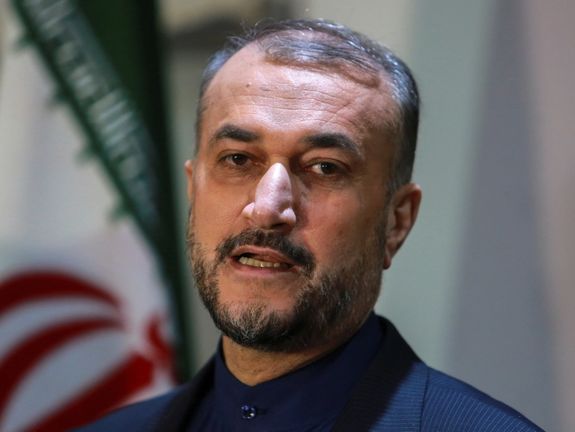
There is no draft agreement from the Vienna nuclear talks to be able to pass judgement, a senior Iranian lawmaker told the official IRNA news agency in Tehran.

There is no draft agreement from the Vienna nuclear talks to be able to pass judgement, a senior Iranian lawmaker told the official IRNA news agency in Tehran.
Mahmoud Abbaszadeh Meshkini, chairman of parliament’s national security and foreign policy committee spoke with IRNA about a meeting on Monday between committee members and Foreign Minister Hossein Amir-Abdollahian. He said lawmakers received “a serious and comprehensive briefing” from the minister and Iran’s chief nuclear negotiator, Ali Bagheri-Kani.
Meshkini said that based on the report lawmakers heard, there is no draft agreement in the Vienna talks to be debated by members of parliament (Majles).
Iran’s legislature is dominated by hardliners, who have been warning the government not to violate Iran’s “red lines” in the nuclear talks. The most important condition is reportedly Tehran’s demand from the United States to remove the Revolutionary Guard (IRGC) from the Foreign Terrorist Organization list.
Meshkini also said that the negotiating parties in Vienna have kept notes from their meetings, but there are still differences. He added that these notes are not a final draft agreement, as each side still makes demands and the other side resists. But Meshkini emphasized that Iran’s “revolutionary government” will not make concession. On the contrary, Iran is in a stronger position to demand concessions “and we see a good future.”
Last week, some lawmakers claimed they had seen the draft agreement and began criticizing the government for having conceded too much in Vienna.
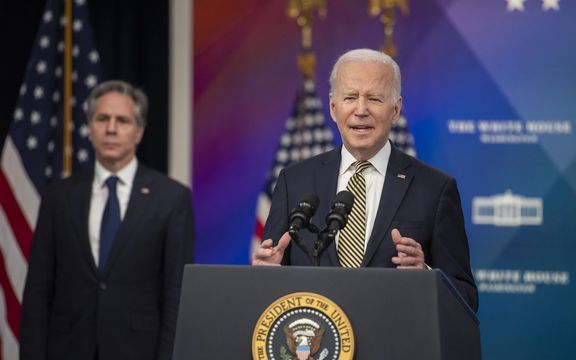
In two separate initiatives Monday, opponents of removing Iran’s Revolutionary Guard from a US terrorist list urged President Joe Biden not to take such a move.
In one initiative, 70 experts writing to Biden told him that removing the Revolutionary Guard “would threaten American lives, harm Gold Star Families, and empower a terrorist organization sponsoring daily attacks against U.S. interests and allies. The delisting would be strategically shortsighted and dangerous to U.S. national security interests.”
Negotiations that started in Vienna in April last year to restore Iran’s 2015 nuclear deal known as JCPOA came to a halt in March as Tehran reportedly demanded the removal of its Islamic Revolution Guard Corps (IRGC) from the US Foreign Terrorist Organization (FTO) list.
In a second initiative, 14 Republican Senators, led by Sen. John Kennedy of Louisiana sent a letter to the White House urging President Biden not to remove the IRGC designation as a terrorist organization that they said is “responsible for hundreds of American deaths.” The Senators also voiced their opposition to a new nuclear deal with Iran that would provide Tehran with billions of dollars of sanctions relief and frozen funds.
“Not only would this removal be wildly misguided, but it would betray our partners and allies in the region—particularly Israel and the Gulf states. These allies and partners already hold concerns that the United States is reducing its regional presence. The enactment of such a deal would provide the Iranian regime access to funds that it would use to destabilize the region through terrorist proxies,” the Senators said.
Opposition to such a move intensified last month with most Congressional Republicans and some Democrats appealing on various occasions to the White House not to consider making a concession.
Last week, signals emerged form the administration that President Biden was opposed to removing the IRGC from the FTO list, but other signs pointed to the possibility that the US might take such a step while keeping the designation of IRGC’s extraterritorial Qods (Quds) Force as a terrorist organization.
In March, 49 Republican Senators issued a statement urging President Biden not to revive the JCPOA without Congressional approval. “The administration has thus far refused to commit to submit a new Iran deal to the Senate for ratification as a treaty, as per its constitutional obligation, or for review under statutory requirements that passed on a bipartisan basis in response to the 2015 deal,” they said.
The 70 experts who wrote to Biden on Monday pointed out that the IRGC “is engaged in active terrorist plots to kill former U.S. government officials,” referring to explicit Iranian threats to kill high-ranking officials of the Trump administration, including former Secretary of State Mike Pompeo.
Among the signatories were former State Department Special Envoy for Venezuela and Iran Elliot Abrams, Ilan Berman of the American Foreign Policy Council, Amb. Paula Dobriansky, former Under Secretary of State for Global Affairs, former US Senator Joe Lieberman and former US National Security Advisor Robert McFarlane.
The letter concluded by saying, “Mr. President, no deal can be worth giving terrorists a green light to kill Americans, empowering a terrorist organization to harm U.S. interests and allies, or turning our backs on American victims of terrorism. For the sake of our national security, we implore you to maintain the IRGC’s FTO designation.”
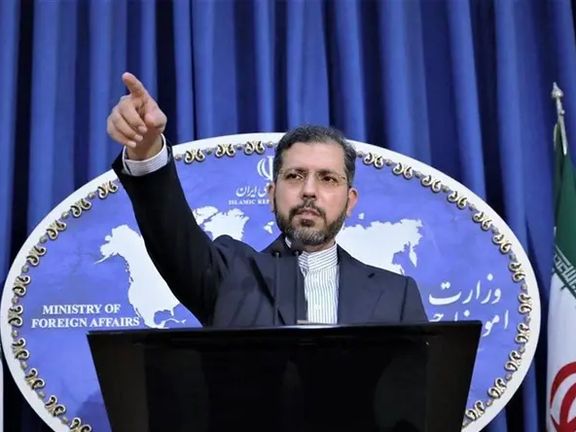
The US has not yet “shown the necessary will” to agree on renewing the 2015 Iran nuclear deal, the Iranian foreign ministry spokesman said Monday.
"What has remained is more than one issue,” Saeed Khatibzadeh told reporters at his weekly press briefing. “All components of maximum pressure need to be removed.”
US ‘maximum pressure’ sanctions have been in place since 2018, when President Donald Trump withdrew the US from the 2015 agreement, the JCPOA (Joint Comprehensive Plan of Action), prompting Tehran by 2019 to expand its nuclear program beyond JCPOA limits.
A deal could have been concluded "months ago" had Tehran surrendered to US demands over its “red lines,” Khatibzadeh said. The spokesman reiterated that the "opportunity for dialogue" would not "remain open forever."
The US and Iran reportedly disagree over whether reviving the JCPOA should see the US remove the Iranian Revolutionary Guards (IRGC) from its list of ‘foreign terrorist organization,’ where Trump placed them in 2019. President Joe Biden’s administration, while committed to restoring the JCPOA, has apparently decided not delist the Guards, the only part of any state’s armed forces so designated, in the face of Congressional opposition to delisting from most Republicans and some Democrats.
The foreign ministry spokesman repeated Iran’s view that the sticking point in talks was the US and not the other world powers with whom Iran has for a year been discussing restoring the JCPOA – China, France, Germany, Russia, and the United Kingdom.
Referring to criticism of lawmakers from the principlist Paydari group, who have claimed Iranian negotiators have made too many concessions in a draft agreement over JCPOA revival, Khatibzadeh said there was "no final text."
"We have not yet reached the point where the American side demonstrates that it is fulfilling its obligations," Khatibzadeh said, claiming the US wanted to maintain as many of its sanctions as possible. His comments came a day after Foreign Minister Hossein Amir-Abdollahian said Sunday the US had presented "new conditions" for removing ‘maximum pressure.’
Iranian media and politicians who support the JCPOA have criticized the government over the talks. In a commentary Monday, Jomhouri Eslami newspaper said it should not have claimed over recent months that talks were near agreement or that Iran’s current economic problems would be solved irrespective of sanctions. "What matters is delivering on these promises,” the conservative paper noted.
Jomhouri Eslami linked US sanctions to rising prices. "Seven months appears to be enough time for the new government to take control of the affairs of the country and stop prices from rising,” it opined. “But many commodities have risen by between 50 to 80 percent during this time and pressure on people has doubled.”
Jomhouri Eslami urged the government of President Ebrahim Raisi "to seek help from those who have successful experience in this matter," presumably a reference to those who conducted earlier international talks under the presidency of Hassan Rouhani.
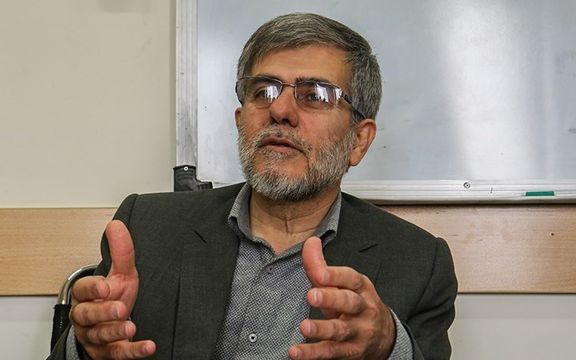
Iran's former nuclear chief Fereydoun Abbasi says Iranian lawmakers have not officially received a copy of a new nuclear agreement drafted in the Vienna talks.
However, several members of the Iranian parliament (Majles) claim that they have read the text of a new agreement between Iran and the United States.
Abbasi, who is currently an member of parliament from Kazeroun in Fars province and a member of the parliament's Energy Committee, told the Iranian Labor News Agency (ILNA) on Sunday that Iran’s negotiators have never briefed lawmakers on the nuclear talks, and the speaker of the Majles has also not shared an official text with MPs.
Abbasi’s remarks come while 250 lawmakers who wrote a letter to President Ebrahim Raisi telling him not to accept any agreement without a US guarantee to uphold the deal, claim to have seen the draft of an agreement.
Last week, hardliner lawmaker, Mahmoud Nabavian, a Paydari Party member, said in an interview with Fars News Agency that he and some other members of the parliament have already read the text exchanged between the Iranian and US negotiators. Incidentally, what the lawmakers wrote in the letter to Raisi on Sunday, was identical to what Nabavian had called for in terms of guarantees.
Reading Abbasi’s remarks carefully, he did not explicitly deny that a text is circulating among lawmakers. What he said was that an official version was not shared with parliament members.
He reiterated that "Unfortunately, no one in Iran has told us what has been going on between the Iranian and US negotiators." He stressed that both the Energy Committee and the National Security Committee have been left in the dark about the negotiations.
Abbasi sounding upset warned that [the officials] should not play with the Majles, adding, "under the circumstances, we cannot offer any advice to the Majles."
When he was told that it appears to outsiders there are good ties between the parliament and the administration, Abbasi said: "The information we need is not communicated to us. I have even asked other MPs whether they have been given any new insight, but it appears that we lack the information that would enable us to defend the negotiators."
Abbasi further said: "We still do not know why the other side refuses to lift the sanctions. We do not know if they have a point to make about the Islamic Revolution, Iran's defensive power, or Iran being an emerging global power.”
He added: "The two sides have no problem regarding the nuclear issue. The 2015 agreement, the Joint Comprehensive Plan of Action (JCPOA) had made everything clear and we had accepted it, although it was not in our interest. And we were carrying it out. Why didn't they [the US side] fulfil their commitments? This is what the negotiators should come forward and tell us."
Asked why Paydari members oppose the nuclear talks, Abbasi said: They are wise men, and they are not obstructionists. Of course, they are party members, but at the same time, they have their independent ideas.
Meanwhile, Abbasi who is known to be linked to Paydari, denied his membership in the party. "My problem with the negotiations is that the negotiators haven not told us anything about it."
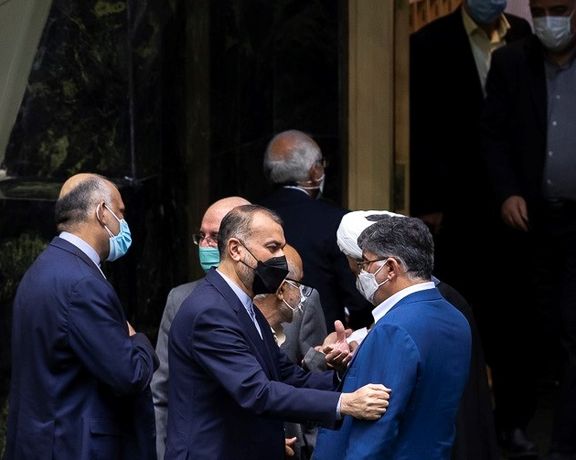
A large majority in Iran's parliament have written to President Ebrahim Raisi calling for credible guarantees from Washington for the renewed nuclear agreement.
In a statement read out at the parliament on Sunday, 250 lawmakers insisted that Washington should provide the necessary guarantees that it would not pull out of the deal again, noting that verbal promises, including speeches by President Joe Biden, do not count as guarantees.
The lawmakers said US decision-making bodies, such as Congress, should approve the agreement so nothing can hinder its implementation in the future.
They also described the existence of a snapback mechanism as a practical failure of the talks, urging assurances against its use under various pretexts.
The MPs reiterated that imposing new sanctions on Iranian organizations and individuals should be prohibited as part of the agreement and it should be noted that the lifted sanctions will not be re-imposed.
They also highlighted that Iran should be able to sell its oil and receive the revenues freely, adding that Iran’s frozen assets should also be released.
While the hardliners’ victory in the 2020 parliamentary election strengthened critics of the 2015 nuclear deal in the 290-seat body, Iran entered talks in Vienna one year ago saying that it would agree to restore the 2015 nuclear deal if the United States lifted ‘maximum pressure’ sanctions.
On Saturday, Raisi insisted Iran will not back down from the "nation's rights" in talks to restore the 2015 nuclear deal with world powers.
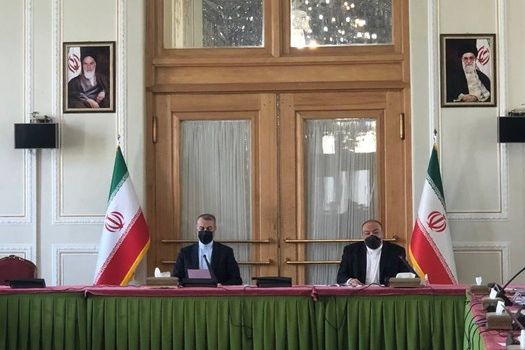
Iran’s foreign minister said Sunday that US President Joe Biden should show some “goodwill”, if his statements about reviving the 2015 nuclear deal are serious.
Hossein Amir-Abdollahian, who was speaking at a meeting of officials dealing with foreign economic relations in Tehran, referred to Washington’s requests for direct talks with Iran and said that the United States should show goodwill. He emphasized that Tehran had asked the USto release some of Iran’s frozen funds prior to a final nuclear agreement but had received no positive reaction.
Amor-Abdollahian first made a direct demand in September 2021, while visiting New York, for the US to greenlight the release of $10 billion from Iran’s frozen funds.
Amir-Abdollahian once again on Sunday reiterated that Iran stands and will continue to stand on its “red lines” in the Vienna nuclear talks.
“The Americans continuously speak of the need for direct talks with Iran. After examining the issue and considering the views the Americans have, we did not find a benefit in direct talks,” he said. Amir-Abdollahian added, that the US “has not done anything positive” to provide confidence.
The chief Iranian diplomat’s remarks did not seem to be suggesting a new formal pre-condition for an agreement in Vienna, but it did appear that he wanted to emphasize the need for some sort of “goodwill” by the Biden Administration.
The negotiations stalled in mid-March after 11 months of talks among the original signatories of the 2015 nuclear agreement known as JCPOA, apparently because of Iran’s demanded from the US to remove its Revolutionary Guard from the list of foreign terrorist organizations.
At one point in his remarks, Amir-Abdollahian said that talks came to a halt after Russia’s invasion of Ukraine and the Western side told Iran that even if all outstanding issues were resolved, Russia would not agree to finalize a deal. In fact, Russia did make a new demandright before the talks ended in Vienna asking the US for waivers from Ukraine sanctions in its dealings with Iran.
Amir-Abdollahian maintained that instead of showing any goodwill, the United States imposed new sanctions on certain Iranian individuals and companies. He suggested that President Biden could release frozen funds with just one “executive order.”
He repeated that Tehran told Washington, “Not to create hurdles” and delay an agreement. “If our red lines are observed,” we can reach a good and lasting agreement, and now “it is the American side that must demonstrate goodwill,” Amir-Abdollahian said.
He added that the diplomatic path is open and claimed that the three European participants in the talks, the United Kingdom, France and Germany are also unhappy about unreasonable American demands.
The foreign minister emphasized that the people of Iran should know the government is striving for an agreement and lifting of sanctions, but he also repeated government’s policy of self-reliance in overcoming the impact of sanctions.
Iran’s economy continues to struggle amid a 40-percent annual inflation rate and a host of other serious issues mainly caused by US sanctions imposed by former president Donald Trump after he withdrew from the JCPOA in 2018. Criticisms and a general mood of despair has intensified in recent weeks as food prices continue to climb, and the government has no immediate solution to offer.